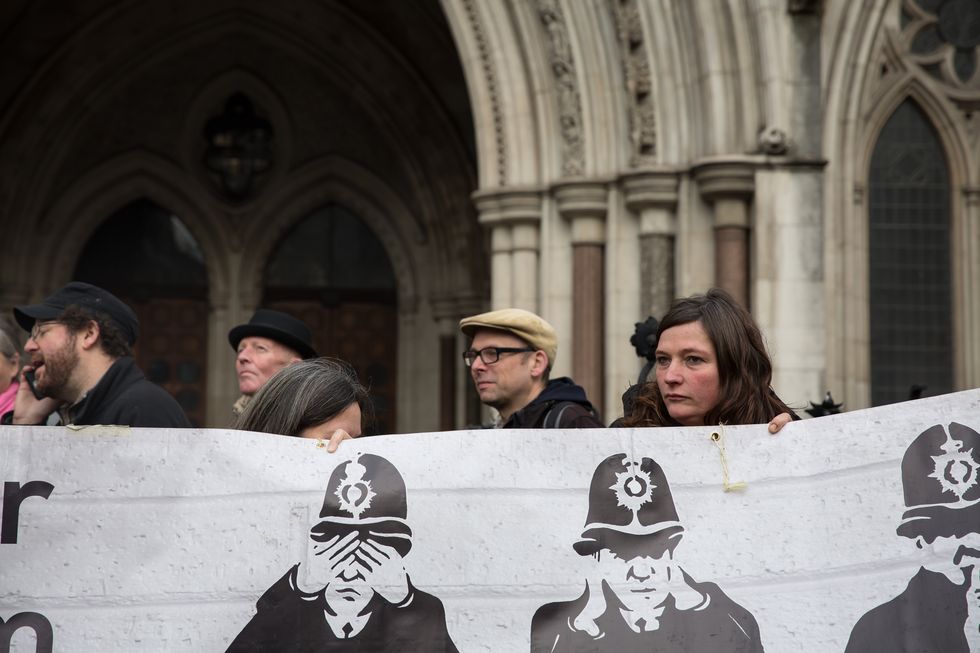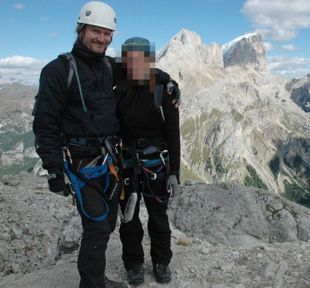It was the summer of 2010, and Lisa Jones was on a long-awaited holiday with her boyfriend in Italy when she realised something was amiss. For the first time in their six years together, she picked up his passport and examined it.'
'Not only did he have a different name (Mark Kennedy) but he had children,' she realised.
In Alison's case, her suspicions began 10 years earlier, when her live-in partner of five years suddenly disappeared.
'Soon afterwards, someone started asking me questions to see if he was a spy and suddenly I began thinking that that would be the only thing that made sense. So I started doing lots of research, checking out things that he told me and many of those things turned out to be false,' she said, speaking in a coffee shop in London this week.
'No one believed me. Everyone thought I was mad. People didn't know about this.'
Both women would later find out their partners had been undercover policemen, sent to keep tabs on the activist groups they were involved with. They'd also discover they weren't the only ones.
Beginning in 1968, a secret unit called the Special Demonstration Squad sent more than 100 undercover British policemen to pose as activists and gather information on hundreds of activist groups - focused on everything from animal rights to anti-fascism. Both Lisa and Alison's boyfriends belonged to this unit.
Piecing together what had happened, the women realised there were common threads to each story. The men said they had tragic backgrounds which explained why they couldn't introduce their girlfriends to their families. At least one couple even had a baby together. Towards the end of the relationships, the men would often feign mental illness or breakdowns before eventually disappearing.
In their real lives, they were all married.
Lisa and Alison came together with six other women - all of whom had been in relationships with undercover policemen - to form the campaign group Police Spies Out of Lives.
Two years ago, in response to a legal challenge brought by the group, the Metropolitan Police issued a historic apology. Martin Hewitt, the Assistant Commissioner, said those relationships were 'abusive, deceitful, manipulative and wrong… a violation of the women's human rights, an abuse of police power and caused significant trauma.' He concluded, 'relationships like these should never have happened.'
In 2014, at the height of the anger about what had happened, the UK also launched an inquiry into undercover policing - the biggest yet. However, proceedings have been slow and hearings are still in the preliminary stages.
In the Royal Courts of Justice in London this week, there was a big turnout for its first session under new chairman John Mitting.
'It's very strange when you come face to face with your spy,' former activist Lois Austin commented wryly from a back row. She had just spotted Peter Francis, a man she knew as a friend in the '90s but hadn't seen since he'd been outed as a policeman more than a decade later. 'Have you met your spy?' she jokingly asked a man behind her.
In the crowd nearby were at least two women who had relationships with policemen posing as activists, as well as several who lived with undercover policemen; were friends with them; or who suspected they had been spied on. Labour leader Jeremy Corbyn's brother was just one of those who turned up to see what he'd find out.
It's hard to overplay the trauma that these revelations have caused. Both Lisa and Alison say what happened needs to be recognised as sexual abuse and an example of ingrained misogyny that runs deep into the British state.
'I really think our lives were incidental, expendable,' Lisa said. 'We were able to be used in this way because our lives didn't matter.'
The women are also calling for the cover names of all undercover policemen to be published, so other women can discover if they have been victims too.
Alison was keen to highlight that there's a fundamental difference between what happened to them and the sort of sexual harassment reporting that's happening today with the #metoo campaign and similar social media efforts. People like Harvey Weinstein and Kevin Spacey 'have been named and shamed using their real names, whereas the people who abused us… unless their real names and their cover names are exposed then they can conceal their abuse.'
It's been seven years since Lisa found out the dearest person to her was a lying stranger, but when she remembers her time with Mark Kennedy, she still expresses incredulousness.
'I always thought he had a job that meant he worked away a lot, but whenever he wasn't working we would be together. It was only afterwards it dawned on me that when he thought he was at work he was with me, and when I thought he was at work he was off with his family,' she said, sadly.
'He was actually being paid overtime for the time we spent together.'
Lisa was involved with environmental and social justice campaigns, but when Kennedy was with her they were more likely to be hanging out at home than at protests or activist meetings. 'We spent a lot of time watching telly and cooking dinner and doing normal things. We had a very domestic life together. We used to go off climbing and watch bands,' she remembered.
'He was the closest person in my life. He came to my dad's funeral.'
When asked if she believed Kennedy planned to get into a relationship just to provide a cover story, she said she wanted to believe he had fallen in love with her. 'I'd like to think I'm not so easily fooled (and) what I saw was genuine. There were feelings there that I recognised.'
Despite the pain they've been through, both Alison and Lisa said they wanted to encourage young female activists not to become paranoid and to continue to believe in others, while being careful.
'Make sure you do trust people,' Lisa said. 'One of my big fears is that they would have won if people didn't work in groups and form relationships between themselves.'















